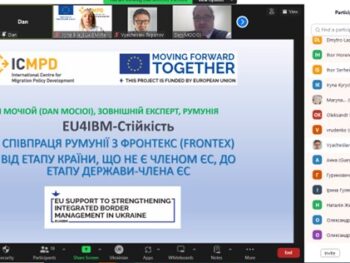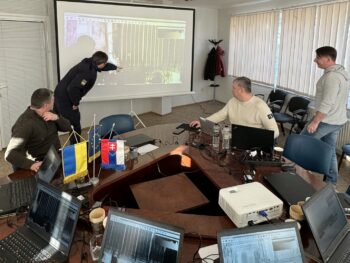On its way to EU accession, Ukraine declares and adopts strategic objectives that correspond to those of the European community. The endorsement of the Integrated Border Management (IBM) Strategy in 2019 stands as a tangible proof of such commitment.
The IBM Strategy aims to facilitate seamless movement of legal travellers and goods across the state border while ensuring its adequate security. It seeks to promote external economic relations and international trade. Moreover, the IBM Strategy effectively deploys mechanisms for cooperation and coordination at the intra-agency, inter-agency, and international levels as well as with the private sector.
The full-scale invasion by Russia back in February 2022 significantly affected the implementation of the IBM Strategy. Ukraine officially obtaining a candidate status for the EU membership also highlighted the necessity to adjust the previously approved activities within the IBM Action Plan.
The EU4IBM-Resilience project, funded by the EU and implemented by the International Centre for Migration Policy Development (ICMPD), once again joined this effort. The project team supported the organization of and participated in the latest meeting of the Inter-Agency Working Group for IBM Coordination held on 16 August 2023 in Kyiv.

The event was attended by representatives of IBM agencies, the Office of the President, the Verkhovna Rada, the National Security and Defence Council Secretariat, Members of Parliament, civil society, and international organizations.
The participants discussed the amendments to the IBM Strategy, which were introduced by the Cabinet of Ministers of Ukraine with regard to the challenges and threats posed by the ongoing war and Ukraine’s recent attainment of a candidate status for the EU membership. They also reviewed the progress in implementing the 2020-2022 Action Plan of the IBM Strategy 2025, and discussed the draft Action Plan for 2023-2025. All attendees unanimously supported the importance of a rapid harmonization of Ukraine’s legal framework with the European and international legal framework, as well as the establishment of the IBM National Coordination Centre.

Barbara Rotovnik, Sector Manager for Border Management at the EU Delegation to Ukraine, acknowledged the effectiveness of the border and customs agencies that continue to ensure smooth operation of the border between Ukraine and the EU member-states amid the full-scale Russian invasion. She also commended the efforts in implementing the IBM Strategy despite the armed aggression by the Russian Federation.
Arunas Adomenas, EU4IBM-Resilience Team Leader, noted that the idea of a National Coordination Centre was initially outlined and introduced to the partners by the project’s expert team. He also confirmed the readiness to further support the implementation of this concept.

“EU4IBM-Resilience never interrupted its support to the State Border Guard Service and the State Customs Service of Ukraine in enhancing IBM, even in times of war. We plan to continue to support our partners in building their capacities to ensure more effective border operation and prevent corruption. We will assist in analysing and refining Ukrainian legislation to further align it with the EU Acquis and will continue to provide border guards and customs officers with the necessary equipment for border monitoring and control,” added Arunas Adomenas.

The National Methodology akin to the European Schengen Evaluation Mechanism became a separate subject for discussion during the meeting. Recently approved by the Cabinet of Ministers of Ukraine, this methodology will be used to assess the quality of implementation of the IBM tasks. The Methodology was developed taking into account some of prior recommendations by the EU4IBM project.





